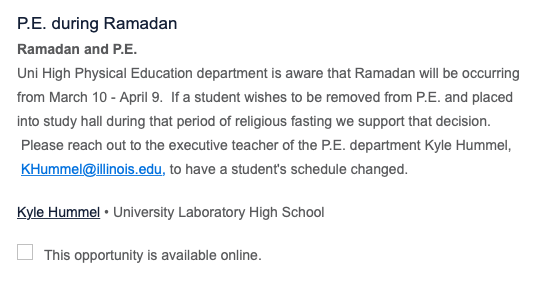Freshman letters prompt discussion about stress
Recently, Freshman teacher Steve Rayburn assigned his English class a thought-provoking new writing assignment. Students were told to address their anxieties and struggles that they faced at Uni through anonymous letters sent to the parents of their class. The letters were sent to parents of different students to preserve the validity of their concerns and the anonymity of their identities.
Rayburn understands the difficulty of discussing stress.
“Uni students are particularly good at thinking, ‘I’m the only one that’s having this problem so I’m not gonna saying anything about it because I don’t want to feel lesser,’” he said.
Since he wanted students to feel comfortable being honest, anonymity seemed like the best path.
“Anonymity might allow the students to be more open and honest,” said Rayburn. “If a student was hesitant they could always say ‘I didn’t write that letter.’ It gave them, I hope, a way to step back and not address if it made them uncomfortable.”
In the past few months, the English department had already been discussing stress.
Dr. Elizabeth Majerus, the executive teacher of the English department explains how she contributed to the conversation.
“The conversation started because I had gotten this ‘get out of jail free’ card… the point of the card was, you need to give yourself a break sometimes and let yourself off the hook sometimes…so I brought this to the English Department and said ‘ Hey, wouldn’t it be great if we could give this to our students?’”
Rayburn used these discussions with other teachers as a starting point for the assignment.
“It [a stress assignment] was a topic that we, the English department, have talked about doing… and I had a chunk of time that I could do it, so I just decided to see what would happen,” he said.
When concerns arose over the actual impact of such an assignment, Rayburn responded, “We’ve talked about this issue before. My freshmen said, ‘If we’ve talked about it before, why are we doing this again?’ and I told them, ‘The squeaky wheel gets the grease.’ If we don’t keep bringing it up… then nothing’s ever gonna happen.”
Many freshmen seemed to like the assignment, as it gave a voice to their concerns.
Anna Park felt as though it was a good idea because Freshmen parents “don’t know about the hidden pressures” at Uni.
Aakash Vasireddy said, “I thought it was pretty important. When it comes to stress, there’s a lot to say.”
Sally Ma also shared that she thought it brought their class closer together. However, Yeowoon Jung did not feel as hopeful about the assignment’s positive impact.
While she feels it “might initiate some action,” she doesn’t see a solution in the near future.
“We’ve tried addressing to our teachers [. . .] they try not to have everything pile up on one day but it hasn’t really worked out, ” she said.
Some freshmen feel as though the culture in their class directly causes some of their anxieties.
Ma brought up how people sometimes like to pretend everything is okay when it may not be.
“You don’t wanna talk about how you got 2 hours of sleep last night, ” she said.
Vasireddy agrees.
“We’re a lot of talented people, and that brings around a lot of competitiveness… prides clash a lot,” he said. “I wouldn’t say there’s any hate between us, but we think ‘that person’s a bit better than me, I need to catch up… I think it’s a problem with Uni in general, this idea that one person has to win, one person has to lose.”
Park detailed this culture further, saying, “Our class is more academically pressured . . . For example, [a student saying] ‘I only got a 99!’ But I got a 95 and I’m happy, so should I feel bad?”
Jung believes the competitiveness between students in their class has been normalized.
“At first, students were doing all these things that were beyond the expectations of teachers . . . [which] made other people feel like they also had to do that much to feel secure about themselves, so now it’s just become the norm to overachieve and do beyond what is necessary,” she said.
Rayburn has observed Uni’s class culture and understands where students are coming from.
“If somebody asks you what you made on a test do you tell them? Or do you say ‘that’s really none of your business’? And if you say that’s really none of your business do they start the rumor that you must’ve done badly? It’s a culture that I really feel the community as a whole…need to be discussing,” he said.
Some freshmen parents in the Uni community were shocked by the stress level students detailed in the letters.
“I was struck by how stressed and desperate the person sounded,” said freshman parent Dov Cohen.
And while Rayburn acknowledges the impact is not as significant as he hoped, he admits he hypothesized that it would turn out like this.
“I think it’s gone, to be honest, pretty much the way I expected. Did I expect suddenly we were gonna call school to a screeching halt and say ‘Oh my goodness, we need to address this?’ No.”
Dr. Majerus strongly agreed with the concept behind the assignment, and chose to make it a part of her Utopias/Dystopias class. She believes that the entirety of the Uni community is capable of improving the climate at the school.
“We can all be learning well and succeeding in school and doing good things without constantly getting everything right and doing everything perfectly.”
For now, Rayburn knows there is going to be a wait for long-term results of the assignment. “It cracked the door, maybe [a] knock at the door. I’m not sure it’ll open the door. I hope that it would. But we’ll just have to wait and see.”
I'm Maher Adoni, part of the class of 2021-- I've been a reporter with the Gargoyle since January 2018. In my spare time, you can catch me studying. Just...
I am a senior at Uni High. I like art, music and the green color from when the sun shines through leaves.

